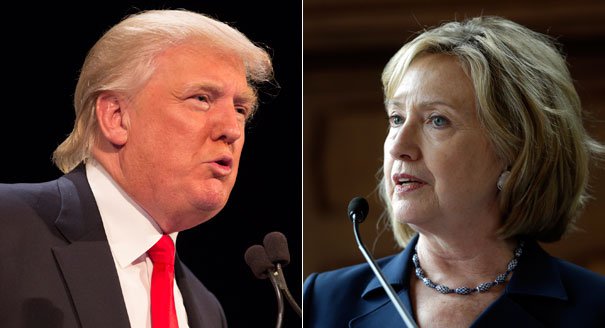
Hillary Clinton and Donald Trump remain tied in Rasmussen Reports’ weekly White House Watch survey. But neither candidate has shown the ability yet to grow his or her basic support, despite Trump’s calls for party unity and Clinton’s hopes of quelling the Bernie Sanders revolt.
Our latest national telephone and online survey finds that 39% of Likely U.S. Voters would vote for Clinton if the 2016 presidential election were held today, while 38% would choose Trump. Eighteen percent (18%) still like some other candidate, and five percent (5%) are undecided. (To see survey question wording, click here.)
A week ago, it was Clinton 40%, Trump 39%. The week before that in Rasmussen Reports’ first White House Watch survey, Trump held a 42% to 37% lead. Hypothetical matchups between the two likely major party presidential candidates have been in this narrow range since last October.
Trump, who now has enough delegates for a first-ballot win at the Republican convention in July, has 76% GOP support. Clinton has the backing of 68% of Democrats, but 21% of the voters in her party prefer someone else or are undecided as Sanders continues his mathematically impossible quest for the Democratic nomination. Democrats are strongly convinced, though, that their party will be unified following its national convention in late July.
Among voters not affiliated with either major political party, Clinton leads 36% to 30%. But one-out-of-three unaffiliated voters (34%) favor another candidate or are undecided.
Even at this early stage of the campaign, there is an unusually high number of voters that Clinton and Trump have alienated or are still unable to attract for some other reason. This is feeding interest in third-party candidates like former New Mexico Governor Gary Johnson, chosen last weekend as the Libertarian Party’s presidential standard-bearer.
Rasmussen Reports will release its findings on a Clinton-Trump-Johnson race at 8:30 a.m. Eastern tomorrow.
The survey of 1,000 Likely Voters was conducted on May 31-June 1, 2016 by Rasmussen Reports. The margin of sampling error is +/- 3 percentage points with a 95% level of confidence. Field work for all Rasmussen Reports surveys is conducted by Pulse Opinion Research, LLC. See methodology.
Rasmussen Reports will update the Clinton-Trump White House Watch matchup numbers every Thursday morning from now until Election Day in November.
Republicans have a lot more confidence in Trump’s honesty than Democrats do in Clinton’s.
Men still prefer Trump, while women favor Clinton.
Those under 40 support Clinton by a double-digit margin, while older voters lean in Trump’s direction. However, younger voters, Sanders’ strongest supporters at this stage, are also the age group most likely to prefer someone other than Clinton or Trump.
Trump leads among whites but trails his Democratic opponent by sizable margins among blacks and other minority voters.
The Republican is the strong favorite of conservative voters, while Clinton is equally favored by liberals. Moderates prefer Clinton by a much narrower margin. Liberals are the most likely group to favor someone else in the race.
Following a damaging report from the State Department’s inspector general, 65% of all voters consider it likely that Clinton broke the law by sending and receiving e-mails containing classified information through a private e-mail server while serving as secretary of State. Still, 71% of Democrats say Clinton should continue campaigning even if indicted and stay in the race until a court determines her guilt or innocence.
The economy remains the most important issue in the upcoming election. Most voters continue to believe the U.S. economy is fair to women and minorities but not to low-income Americans.
Voters give President Obama mixed marks on his handling of economic issues, and voters expect more of the same if Clinton takes the White House. Republicans and unaffiliated voters think Trump would do a better job than Obama; Democrats say he would do worse.
Most voters say a televised debate between Trump and Sanders wouldn’t have impacted their vote this November.



Expositores: Oscar Vidarte (PUCP) Fernando González Vigil (Universidad del Pacífico) Inscripciones aquí. Leer más
Una retrospectiva para entender los próximos cuatro años. Leer más
En la conferencia se hará una presentación de los temas más relevantes del proceso de negociación se llevó a cabo desde el 2012, así como del acuerdo de paz firmado entre el Gobierno colombiano y la guerrilla de las FARC a finales del 2016. Se analizarán los desafíos y las... Leer más
El Observatorio de las Relaciones Peruano-Norteamericanas (ORPN) de la Universidad del Pacífico es un programa encargado de analizar y difundir información relevante sobre la situación política, económica y social de Estados Unidos y analizar, desde una perspectiva multidisciplinaria, su efecto en las relaciones bilaterales con el Perú.
© 2026 Universidad del Pacífico - Departamento Académico de Humanidades. Todos los derechos reservados.

